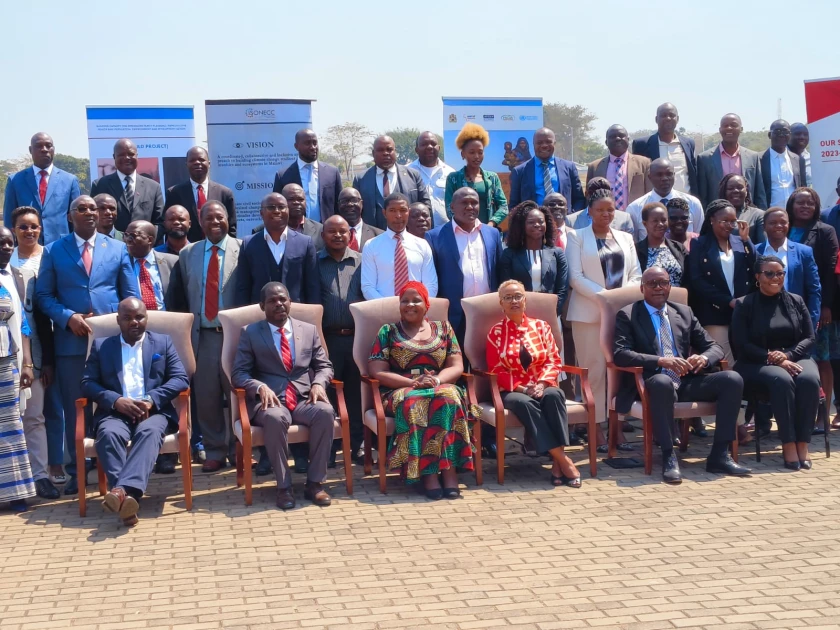Africa leads the globe in push to include Health narrative as part of Climate Change agenda

Africa Health and Climate Change stakeholders meeting in Lilongwe, Malawi on August 22, 2023. PHOTO| COURTESY

Audio By Vocalize
United Nations Framework Convention on Climate Change (UNFCCC) will have the 28th deliberation on Climate Change Action in Dubai, United Arab Emirates in November/December 2023 marking 28 years of climate change and its effects on nature. Health which is the source of life has never gotten Global attention on climate change discussions and planning.
As Africa gear up for the Africa Climate Summit and Africa Climate Week in Nairobi, Kenya early September 2023, climate change and health stakeholders are meeting to devise an African common position on climate change and health to rally UNFCCC to consider health as an important area and to unconditionally be incorporated in the UNFCCC Global agenda.
The African health and climate change partners hold that there is an urgent need to have health as part of negotiations in the global arena so that climate change-resulted health conditions don’t get out of hand.
Africa is leading the global partners in the push to have the health sector recognized by UNFCCC, citing importance of healthy people in effectiveness or success of various sectors.
At the opening of an inaugural high level meeting in Lilongwe, Malawi, various African players are deliberating on finding water tight grounds linking health to climate change, reasons to have health be prioritized on climate change discourse and have it form part and parcel of UNFCCC negotiations.
Malawi's Minister for Health Khumbize Kandodo Chiponda, in her opening and key note address to the delegates, emphasized importance of togetherness for Africa in addressing climate change and health citing Malawi to have been on the receiving end both in development and health crisis as a result of climate change crisis.
In her speech, Chiponda noted that Malawi has suffered abnormal cases of malaria and cholera outbreaks, which is still being experienced even in hot weather hence the need to get UNFCCC recognize importance of incorporating health in the global negotiation tables.
“Climate change is no longer a distant threat, it is here with us now, it is evident that adverse effects of climate change are increasingly impacting our planet, affecting not only the environment, but also the earth and well being of our communities."
"It is a reality we are seeing and feeling every day, its no longer something we just talk about, at the global level, it is now regarded to be the greatest threat to human health," she added.
On his part, Dr. Mithika Mwenda, the Chief Executive Officer, Pan African Climate Justice Alliance (PACJA), commended all the partners who have come out to walk the journey of seeing climate change and health officially being recognized in UNFCCC plans and agenda.
”This certainly is the beginning of a journey together not ending with this event, to map a major campaign to bring health as a critical sector in international climate change negotiations and interventions not only in Africa but globally.”
“This critical issue is reflected in our strategic plan 2021-2030 which addresses critical climate health and resilience building area as important issues of adaptation to climate change,” he added.
Amref Health Africa, through Dr.Githinji Gitahi - Global CEO of Amref Africa, held the opinion that health has been an orphan of climate change conversation despite the fact that it will have the largest impact with the increase in global warming.
"Across the continent, we have significant pre-mature deaths, related to maternal health, child health related to infectious diseases. We work in 35 countries in Africa, we have seen that this land scape is changing, on maternal, child mortality, infectious diseases, all these we are convinced that they are or they could be climate change related. The change is also taking away the gains we have made, therefore it is going to be worse," said Dr Githinji.
Dr. Eliya Zulu, the Executive Director African Institute for Development Policy(AFIDEP), urged African climate change and health professionals meeting in Malawi to brainstorm on the nexus of climate change and health to look keenly into evidence needed to qualify and connect health with climate change.
“One of the critical things we need to work on as we talk about climate change health nexus is what sort of evidence do we need to put on the table to not only say that this is important in perspective of human rights or climate justice but also on investment perspective," he emphasized.
At the closure of the ongoing regional workshop on health and climate change dubbed ‘In pursuit of a unified African position on health in climate negotiations’, delegates will come up with a common ground to present during African Climate Summit and African Climate Week in Nairobi Kenya, and later proceed to lobby at the 28th climate change gathering in Dubai later in the year.


Leave a Comment